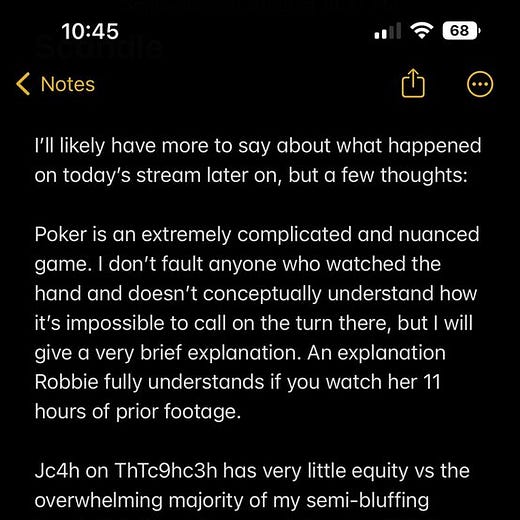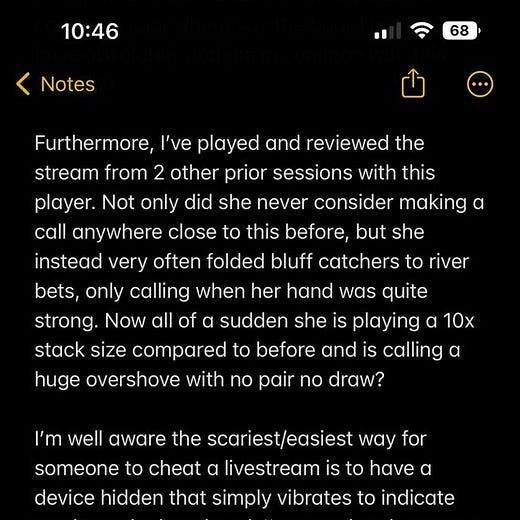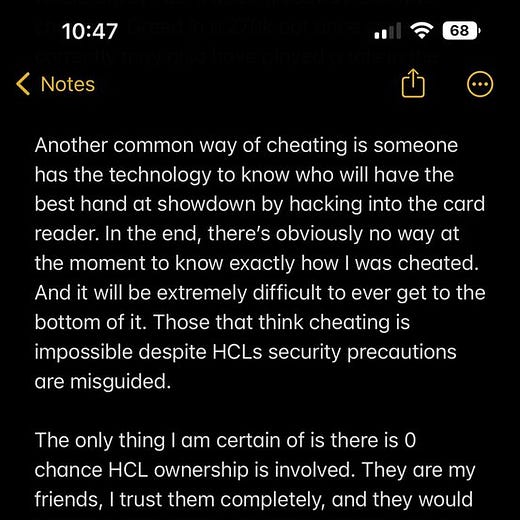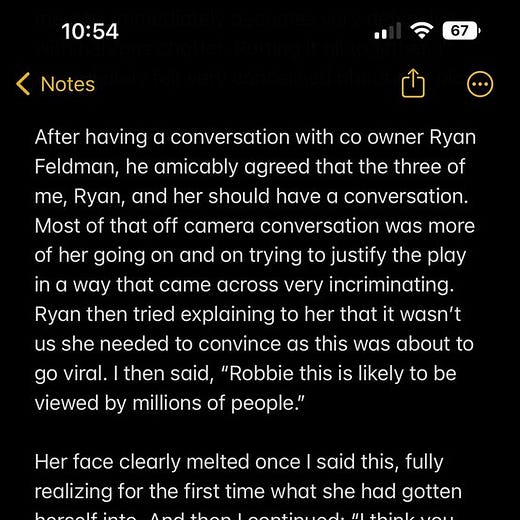A poker hand explained
There’s a cheating controversy in the world of high-stakes poker and everyone in that world is jabbering about it, which is normal, but people who are unfamiliar with poker are also pontificating and some of them really really shouldn’t. I’m avoiding quoting a specific tweet (which triggered this essay) that blamed the controversy on misogyny because while it’s a really really (REALLY) arrogantly dumb tweet, I’m trying to be a better person and not dunk on folks.1
Still, it did inspire me to write a poker hand explainer!2
The problem with poker is a lot of folks think they know the game when they don’t. They’ve seen it played in the movies, or maybe they’ve even played a little with friends, and they believe they understand what’s going on. It’s classic Dunning-Kruger.3 This is like me thinking I understand competitive bicycle racing just because I run daily errands on my bike. In fact, I know those guys are sixteen levels above me and I haven’t a clue why they do most of the stuff they do.
This essay was triggered by a woman’s tweet, but in my experience men are much more prone to overestimate their poker knowledge. I think there’s a macho vibe around poker that oozes “if you’re a real man, you understand the game” and guys are especially loath to admit they might not have a clue.
With poker, I’m not a genius, but I’ve played serious poker for many years (I used to play about 1000 hours a year, I kept records), so I know a thing or three. (“Serious” meaning playing in games where you can lose a few months’ rent in a single hand.) I’m good enough to win more than I lose in casino poker but not good enough to play with the real pros (although sometimes I foolishly have!). If anyone who’s played with me reads this essay, be kind! I’m not saying I’m an expert, I’m just above average (because the average is so bad).
A note on gambling: Poker is not gambling, poker is a game of skill. If you make good choices, you will win in the long run, if you make bad choices you will lose. Unless, of course, you cheat (which is a kind of good choice). You may win after a specific bad choice, but bad choices will kill you in the long run (like Russian roulette).
Anyway, here’s the controversial hand:
The game is Texas Hold ’em and it’s being shown on the Hustler Casino Live stream, which is why we have the story. It’s also why cheating is a possibility. [Added note: I believe the live stream was on delay, so cheating that way would require someone who had early access to that stream.] I’ll use a little lingo but I’ll try to fully explain what’s happening for the non-poker folks.
Preflop (when they just have two cards), Garrett Adelstein, an experienced pro, raises with 8c7c (8 of clubs and 7 of clubs). This is an aggressive play but nothing special in the game. Robbi Jade Lew, a less experienced player, makes a slightly odd call with a Jc4h (Jack of clubs and four of hearts, her cards don’t match). These are very bad cards but she may be in the mood to make a move later in the hand. (“Make a move,” meaning bluff to scare the other player into folding.)
The flop comes out (“flop,” the first three cards they will share), TcTh9c (ten of clubs, ten of hearts, nine of clubs). Adelstein now has an excellent hand, because there are 8 possible cards that will get him a straight and 9 possible cards that will get him a flush (although two of those are also straight cards). He bets $2500 and Lew, with nothing but a jack high in her hand, makes another call. Again, I have to assume she’s getting ready to make a move. Poker players call this “floating,” as in “he bet and she floated a call.”
Now is where it gets really weird. A 3h (three of hearts) comes out. This is a nothing card, it helps neither of them. Technically she has the “better” hand (a pair of tens with a jack vs. his pair of tens with an eight) but she can’t know that.
Adelstein bets $10,000 (five months of my rent). He still has nothing but he has 15 cards to make a straight or flush and so aggression makes sense. Lew now raises $10,000 more! This is pure bluff. She has a garbage hand with no potential but seemingly she’s putting him on a bluff and is trying to push him off his hand (scare him into folding). This is very aggressive but not necessarily stupid. (Although such a small bluff seems a bit foolish to me, but there’s some next-level beyond-my-pay-grade poker where it might make sense.)
Adelstein raises all-in, all his chips, $120,000 more. This is normal. He has a great potential hand, he’s trying to force off a lot of hands that could technically beat him but can’t stand the heat. Hands like hers.
Now is where it gets Twilight Zone, Dark Shadows, Black Mirror weird. She calls his bet! She freaking calls?!? I still don’t get it.
See, if she bluffed with her hand, it makes some sense, because he might fold, but to call, she has to believe she has a better hand.
The key question here is, holding her garbage cards, what does she think he has? He either has a made hand (a hand that already beats her, like a ten in his hand), in which case she’s sunk, or he’s bluffing, but even if he’s bluffing, his hand could still be better than hers. In fact, it’s kinda hard for his hand not to be better than hers.
To run Adelstein’s hands down, he might have…
An already made hand: he wins
An ace, king, queen high or a pair below jacks: he’s still way ahead. Heck, he’s ahead with almost any JACK high!
8c 7c, his actual hand: now she’s ahead, but because he has 20 cards that will win for him, any club, any 6, any jack, any 7, and any 8, she’s still only a 55% to 45% favorite
Here is the situation when all the money goes in (with one card yet to come). She’s slightly ahead (but again, she really couldn’t know that).
Lew may have had a “read.” In poker, this is when you look deep into the other player’s soul (or see his left pinkie finger twitching) and realize he’s bluffing. The thing is, a read doesn’t tell you exactly what his cards are, it just tells you (maybe) that he’s weak or strong. In that situation, you’re going to put your opponent on a range of hands, not an exact hand (“put your opponent on,” guessing what cards they might have). And because Lew’s hand is itself so weak, she could have a read that he’s weak, but he could still easily have a stronger hand than hers, a KQ of clubs, for instance.
In other words, even if she has a read that he’s bluffing, there’s a very good chance he would be bluffing with the best hand.
Let me say that again for the pull quote:
In other words, even if she has a read that he’s bluffing, there’s a very good chance he would be bluffing with the best hand.
That’s the hand, that’s it.
Either she was cheating, she somehow misread her hand, or she’s just a horrible player (or had one of those crazy brain sparks that can make us do stupid things). I honestly don’t know the answer, I don’t know if we can ever know the answer. Lew herself, when questioned after the hand said, “I thought you had ace high,” but that makes zero sense as ace-high would have been an 86% favorite to beat her hand. Much later, she had other answers which made even less sense (keep reading).
On the surface, cheating seems a good answer. The game was being live-streamed. She could have had a partner [with early access to the stream] dial a device placed next to her skin that vibrated saying “you have the best hand.”4 Then again, I have seen players do really dumb things sometimes, even moderately experienced players. Brain sparks happen.
Other stuff happened. He tweeted about it, she tweeted about it. Later, after a private conversation, she gave back the money she’d won. Below is his version of what happened before and during that conversation. You might think that giving the money back was proof of cheating but I could also see it as her afraid people would think she cheated (which some people will think anyway).
Here’s a video by Doug Polk with lots of poker lingo-filled commentary. Polk gives some background, including footage of some earlier play that he thought might be hinky. The hand in question starts at the 6-minute 50-second mark. He also goes into her explanations which he finds implausible. Even if you’re not into poker, you might want to watch just to hear him speak an alien language. In the end, Polk thinks cheating is the most likely answer.
Again, I don’t know if she was cheating. I think Adelstein and Polk underplay how stupid poker players can be (although this was an unusually stupid play), but I can understand why Adelstein thinks he was cheated. I’ve seen smart players argue it didn’t have to be cheating, but I’ve seen no smart players argue she played the hand well.
One final note regarding outcome-based judgments. Some folks (not poker folks) have said, “well, she won, it was the right play.” No, no, god-with-strawberry-sauce-on-top-of-garlic-mashed-potatoes no. Making the wrong move is the wrong move whether you win or not. Driving down the highway at 140mph while making out (snogging for the Brits) with your best friend’s mom and not dying doesn’t mean you were right to do it (although what a way to go). Or to put it in a gambling context, if I offer you a bet where we flip a coin and if it’s heads I pay you $10,000 and if it’s tails you pay me $1,000,000, that is a bad bet. If you take the bet and win, that doesn’t make you a smart gambler. You can babble for hours about having a read on the coin or that you’re wearing your lucky never washed underwear but you were still betting like a moron. Of course, that’s why poker is so great: Sometimes the bad players win (and then convince themselves they’re geniuses). If they never did, they wouldn’t play, and poker would suck.
I was really torn on this. The tweet I saw was so arrogantly wrong that it hurts me not to quote-tweet it. And after her initial tweet, when she was criticized for it, she complained about the “demographic” of those criticizing her, suggesting it was all misogyny, so I really felt she deserved correction, but… I’m trying to be a better person. Anyway, don’t assume misogyny when it just might be you don’t know anything about the subject being discussed.
I slammed this baby out pretty fast so please forgive the likely typos.
“The Dunning–Kruger effect is a cognitive bias whereby people with low ability, expertise, or experience regarding a certain type of a task or area of knowledge tend to overestimate their ability or knowledge. Some researchers also include in their definition the opposite effect for high performers: their tendency to underestimate their skills.”
A technical point for the poker nerds. After she called, she agreed to “run it twice” (sometimes called “doing business”). This means, they divide the pot into two halves and then deal out the last card twice. This means they each have a chance to win half the pot. If both cards favor you, you win the whole pot. Some say if she was cheating by knowing the final card, she wouldn’t have done that. Maybe not. But if she didn’t know the last card, if all she knew was her hand was better than his, then running it twice makes total sense. She’s only a modest favorite. Poker nerd moment over.








I’ve known gamblers, big and small, my entire life. Professionals. You get a feel. My feeling is she cheated. Her behavior is consistent with indecision and fear. Still, just a guess.
Solid quantitative analysis, but I think your article flubs the qualitative analysis. The misogyny claim is based not on how statistically good her had was—after all, we all agree on the numbers and arithmetic—it's based on how unusual her playing was. Garrett has been playing at this level a long time and he's definitely been on the losing end of a "hero call" before. The fact that there's a term for it shows that while it's uncommon, it's not so unusual that it's never been done (and talked about) before. In fact, I'd bet money that been on the winning end of a few "hero calls" himself in his long career.
In the video the announcer says "I'm speechless, usually Garrett would be fairly congratulatory if somebody made a hero call…like that. But he seems somewhat disturbed here by what just happened. It's literally the most disturbed look I've ever seen Garrett give.” Notice that this is happening while someone says "that is some fucking poker right there." And another person tips their hat off to her and congratulates her. Somone says "call of the year right there."
If he'd said anything like "you got lucky" or something passive aggressive like "good job winning with a bad hand" then it wouldn't have been a problem. It's just be a dude who lost and was, maybe, a little sore about it. It's the aggression and the accusation of cheating that's misogynistic, not the correct analysis that she had a bad hand and most people would not have bet the way she did.